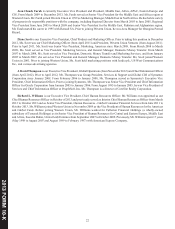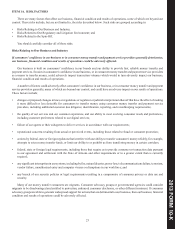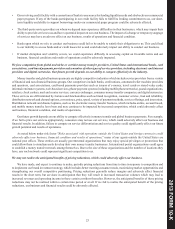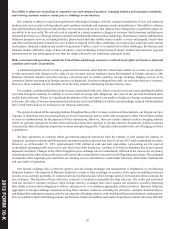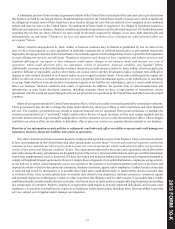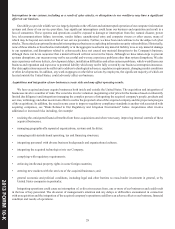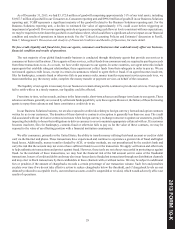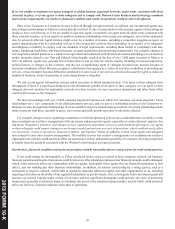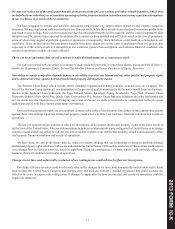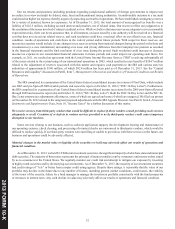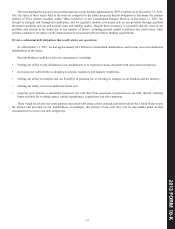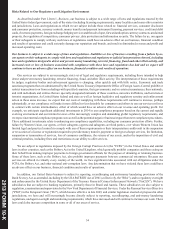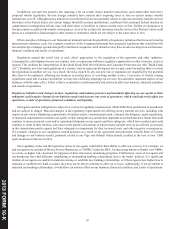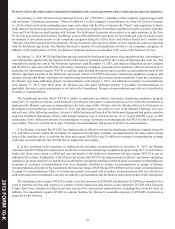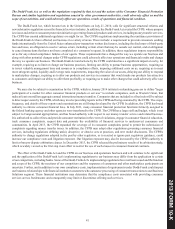Western Union 2013 Annual Report Download - page 142
Download and view the complete annual report
Please find page 142 of the 2013 Western Union annual report below. You can navigate through the pages in the report by either clicking on the pages listed below, or by using the keyword search tool below to find specific information within the annual report.
2013 FORM 10-K
32
Our tax returns and positions (including positions regarding jurisdictional authority of foreign governments to impose tax)
are subject to review and audit by federal, state, local and international taxing authorities. An unfavorable outcome to a tax audit
could result in higher tax expense, thereby negatively impacting our results of operations. We have established contingency reserves
for a variety of material, known tax exposures. As of December 31, 2013, the total amount of unrecognized tax benefits was a
liability of $125.5 million, including accrued interest and penalties, net of related items. Our reserves reflect our judgment as to
the resolution of the issues involved if subject to judicial review. While we believe that our reserves are adequate to cover reasonably
expected tax risks, there can be no assurance that, in all instances, an issue raised by a tax authority will be resolved at a financial
cost that does not exceed our related reserve, and such resolution could have a material effect on our effective tax rate, financial
condition, results of operations and cash flows in the current period and/or future periods. With respect to these reserves, our
income tax expense would include (i) any changes in tax reserves arising from material changes during the period in the facts and
circumstances (i.e. new information) surrounding a tax issue, and (ii) any difference from the Company's tax position as recorded
in the financial statements and the final resolution of a tax issue during the period. Such resolution could increase or decrease
income tax expense in our consolidated financial statements in future periods and could impact our operating cash flows. For
example, in 2011, we reached an agreement with the United States Internal Revenue Service ("IRS") resolving substantially all
of the issues related to the restructuring of our international operations in 2003, which resulted in a tax benefit of $204.7 million
related to the adjustment of reserves associated with this matter and requires cash payments to the IRS and various state tax
authorities of approximately $190 million, of which $92.4 million has been paid as of December 31, 2013. See the "Capital
Resources and Liquidity" discussion in Part II, Item 7, Management's Discussion and Analysis of Financial Condition and Results
of Operations.
The IRS completed its examination of the United States federal consolidated income tax returns of First Data, which include
our 2005 and pre-Spin-off 2006 taxable periods and issued its report on October 31, 2012 ("FDC 30-Day Letter"). Furthermore,
the IRS completed its examination of our United States federal consolidated income tax returns for the 2006 post-Spin-off period
through 2009 and issued its report also on October 31, 2012 ("WU 30-Day Letter"). Both the FDC 30-Day Letter and the WU 30-
Day Letter propose tax adjustments affecting us, some of which are agreed and some of which are unagreed. We filed our protest
on November 28, 2012 related to the unagreed proposed adjustments with the IRS Appeals Division. See Part II, Item 8, Financial
Statements and Supplementary Data, Note 10, "Income Taxes" for a further discussion of this matter.
We receive services from third-party vendors that would be difficult to replace if those vendors ceased providing such services
adequately or at all. Cessation of or defects in various services provided to us by third-party vendors could cause temporary
disruption to our business.
Some services relating to our business, such as software application support, the development, hosting and maintenance of
our operating systems, check clearing, and processing of returned checks are outsourced to third-party vendors, which would be
difficult to replace quickly. If our third-party vendors were unwilling or unable to provide us with these services in the future, our
business and operations could be adversely affected.
Material changes in the market value or liquidity of the securities we hold may adversely affect our results of operations and
financial condition.
As of December 31, 2013, we held $1.9 billion in investment securities, the significant majority of which are state and municipal
debt securities. The majority of this money represents the principal of money transfers sent by consumers and money orders issued
by us to consumers in the United States. We regularly monitor our credit risk and attempt to mitigate our exposure by investing
in highly-rated securities and by diversifying our investments. As of December 31, 2013, the majority of our investment securities
had credit ratings of "AA-" or better from a major credit rating agency. Despite those ratings, it is possible that the value of our
portfolio may decline in the future due to any number of factors, including general market conditions, credit issues, the viability
of the issuer of the security, failure by a fund manager to manage the investment portfolio consistently with the fund prospectus
or increases in interest rates. Any such decline in value may adversely affect our results of operations and financial condition.
•
•
•
•
•


